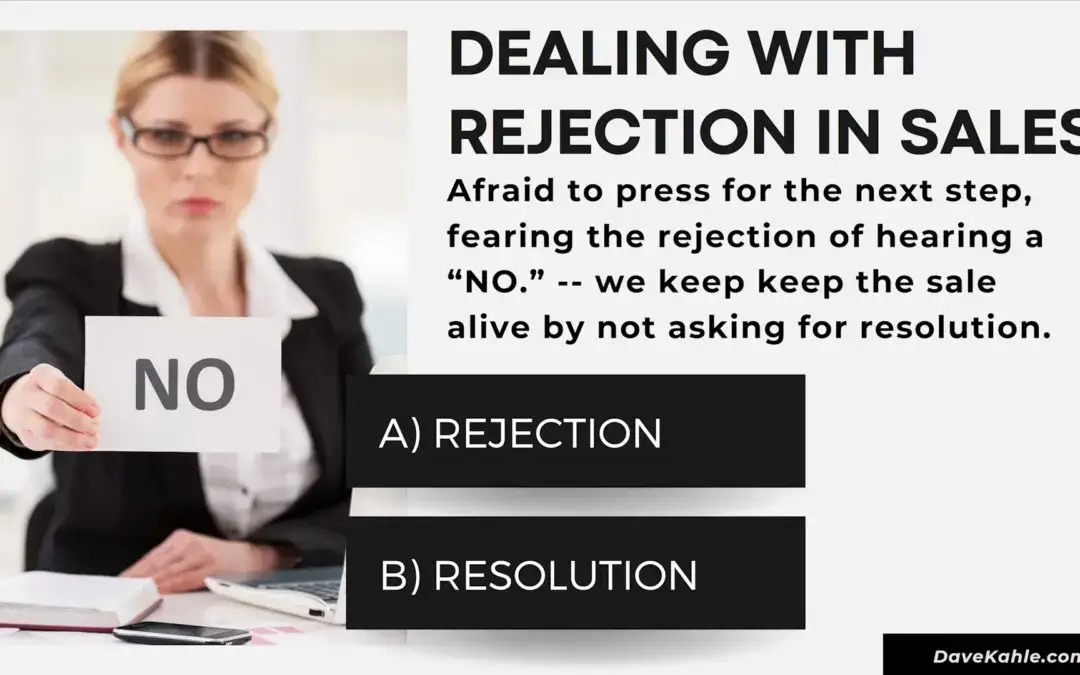Q. Here’s an issue that I confront with my salespeople all of the time. They are afraid to press for the next step, because they don’t want to experience the rejection of hearing a “NO.” So, they try to keep the sale alive by not asking for resolution. This keeps them involved with customers who aren’t interested and prevents them from moving on. Any thoughts?
A. Great question. There are two issues here. First, dealing with the sense of rejection that very often comes with hearing a “no,” and, second, pushing for a resolution so that you don’t waste time with people who aren’t going to say “yes.”
Let’s deal with each of these issues. First, the sense of rejection. Very few salespeople have such thick skin that hearing a “no” doesn’t bother them at all. On the other hand, having people say “no” to you is a regular part of the job. Given these two realities, which means that every professional salesperson, if he is committed to a career in sales, has to develop a strategy for dealing with the continuous stream of “nos” that comes with the job.
I’m not sure this is a training issue. I think it is a self-management challenge, in that, regardless of how sensitive and impacted a salesperson is by hearing “no”, he/she still must develop his own means of handling it. Every salesperson can have a different strategy, but it is important that they do have a strategy.
It sounds like your guys haven’t developed their strategies. I suspect that they have never really thought about it. If that’s the case, then you have a role to play in helping them identify the issue and develop self-management strategies to cope with it.
You may want to bring these issues up with your sales force in a frank discussion at a sales meeting. It should go like this:
* Hearing “no” is a regular part of the job of the salesperson.
* If you expect to be a salesperson, you will hear a lot of “nos.”
* You cannot allow yourself to be affected by the rejection.
* Therefore, you need to develop a self-management method of dealing with your response to “no.”
* Let’s brainstorm some ways we can do this.
By bringing it up in a group meeting, you send the message that this is a part of what it means to be a professional salesperson, and you would have helped each of them formulate a personal strategy.
At this point, you may still have some people who are petrified of hearing a “no.” If someone consistently avoids hearing a “no” because they can’t deal with it personally, it may be time for that person to look for another line of work. It may also be that they are not really committed to a career in sales, and therefore see no reason to invest the time and energy in something so intimately connected with the job. You can help this person to recognize that via a one-on-one meeting.
In regard to the second issue — pushing for a resolution so that you don’t waste time with people who aren’t going to say “yes” — I’m of the school of professional sales people who believe that it is better to hear a “no” early on in the sales process than it is to linger for months with uninterested prospects.
This is a training issue. That means that you can address this in a training session in which this concept is addressed. I teach a simple, easily remembered rule: Always Ask for Action. (AAA). Teach that concept, and then help them to implement it by creating some sample “closing” questions. Your sales force develops closing questions, and then practice those questions. At this point, you’ll have done everything you can to imbed that competency into them. Time to expect them to improve their performance on this issue and hold them accountable for doing so.
By the way, a great source of specific tools to help you close is my book, Question Your Way to Sales Success. Check it out here.
QA-SM-32
Related Resources



